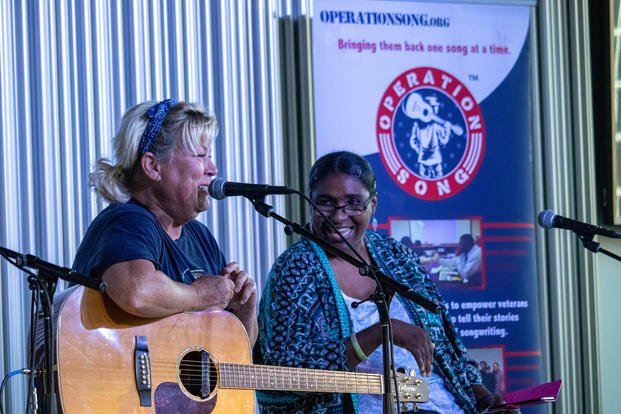The Department of Veterans Affairs is expanding a partnership with a Nashville nonprofit that links veterans with professional songwriters and musicians at retreats the VA describes as "helping veterans share and cope with military experiences through music."
Bob Regan, a Grammy-nominated songwriter and founder of "Operation Song," is up-front about the group's goals: "We're not therapists. We're not here to judge you. We're not here to fix you."
What Operation Song can do is take veterans' words and thoughts, "move 'em around and make 'em rhyme," and set them to music, said the 70-year-old Regan, who has written songs recorded by Trisha Yearwood, Reba McEntire, Billy Ray Cyrus, Lee Greenwood, Hank Williams Jr. and others.
"Just sit them in rooms and let them tell their stories," said Regan, who holds a degree in psychology from the University of California at Davis and founded Operation Song in 2012.
The program held a pilot retreat for five veterans last year, and another for 10 veterans that concluded earlier this month. Regan said he hopes to offer quarterly retreats for veterans next year.
In announcing the expanded partnership with Operation Song last week, VA Secretary Robert Wilkie said that the department is open to alternative therapy methods to aid veterans coping with the stress of transitioning to civilian life and other issues.
"VA is always striving to find unique ways to help veterans build on their military experiences, and music therapy is just one component of VA's robust Recreation Therapy programs," he said in a statement. "Music can provide an outlet for expression of feelings, as well as be an avenue of communication for those who find it difficult to express themselves."
Regan said the idea for Operation Song came to him on overseas tours for Armed Forces Entertainment. "Songwriting is an art form they can relate to," he said.
"Just sit them down, have a conversation, tell me about yourself" and the process begins, he added. The organization's motto is "Bringing them back one song at a time."
Regan began with weekly sessions at the VA Medical Center in Murfreesboro, Tennessee, and the program developed to the pilot retreat conducted last year. "We reached out to the VA and said, 'Let's give it a try,'" he said.
When the program is successful, the resulting song is recorded by professional musicians who donate their time in studio settings, and the veterans take those songs with them, Regan said.
Since the program started, more than 750 songs have been written. One of them, "Last Monday in May," is about Memorial Day through the years.
It was a collective effort written by six Iraq, Afghanistan and Vietnam veterans; it has been performed on the National Mall for the past five Memorial Days and also at the Grand Ole Opry, according to Regan.
Another song, "West Point to Arlington," was written by a West Point graduate to honor another graduate who was killed in Afghanistan.
According to the VA, a background in music is not necessary to participate in Operation Song, but interested veterans must be referred by their VA health care provider, be able to function independently and be willing to travel to a retreat location. The program is offered at no cost to participants.
The program is fully funded this year through the support of Veterans Canteen Service, and the VA encourages donations and sponsorships from organizations and individuals who would like this type of programming to reach as many veterans as possible.
To volunteer or donate, visit the VA's website.
More information about Operation Song can be found at the program's site.
The organization's website states that "songwriting programs create an opportunity to transform service-related issues, injuries and illnesses into a structured, musical outlet as an enhancement of traditional therapies and/or treatments."
"It just works -- flat out," Regan said, although he's not quite sure how. "They have a song to go forward. You might have been close to the edge; now you've got some space."
-- Richard Sisk can be reached at Richard.Sisk@Military.com.















